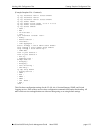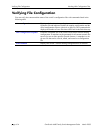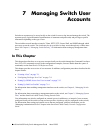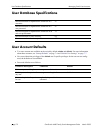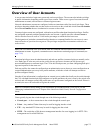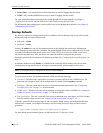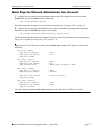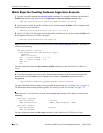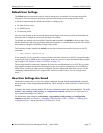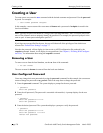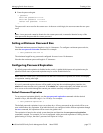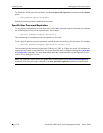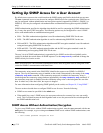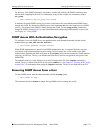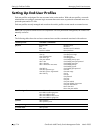
Managing Switch User Accounts Overview of User Accounts
OmniSwitch 6600 Family Switch Management Guide March 2005 page 7-7
Default User Settings
The default user account on the switch is used for storing new user defaults for privileges and profile
information. This account does not include a password and cannot be used to log into the switch.
At the first switch startup, the default user account is configured for:
• No read or write access.
• No SNMP access.
• No end-user profile.
Any new users created on the switch will inherit the privileges or the end-user profile of the default user
unless the user is configured with specific privileges or a profile.
The default user settings may be modified. Enter the user command with default as the user name. Note
that the default user may only store default functional privileges or a default end-user profile. The default
user cannot be configured with both privileges and a profile.
The following example modifies the default user account with read access and write access to all CLI
commands.
-> user default read-write all
In this example, any new user that is created will have read and write access to all CLI commands (unless
a specific privilege or SNMP access is configured for the new user). For more information about configur-
ing privileges, see “Setting Up End-User Profiles” on page 7-14.
The privilege default is particularly important for users who are authenticated via an ACE/Server, which
only supplies username and password information; or for users who are authenticated via a RADIUS or
LDAP server on which privileges are not configured. For more information about these servers, see the
“Managing Authentication Servers” chapter of the OmniSwitch 6600 Family Network Configuration
Guide.
How User Settings Are Saved
Unlike other settings on the switch, user settings configured through the user and password commands
are saved to the switch configuration automatically. These settings are saved in real time in the local user
database.
At bootup, the switch reads the database file for user information (rather than the boot.cfg file). The write
memory, copy running-config working, or configuration snapshot command is not required to save
user or password settings over a reboot.
For information about using the write memory, copy running-config working, and configuration
snapshot commands, see Chapter 4, “Managing CMM Directory Content,” Chapter 6, “Working With
Configuration Files,” and the OmniSwitch CLI Reference Guide.



